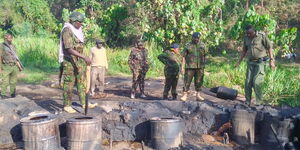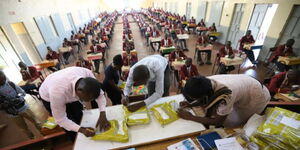The government has been put on the spot after it emerged that Kenya spent Ksh4 billion on the maize flour subsidy programme without parliamentary approval, a decision that might have led to the misuse of public funds.
This emerged following a report on Kenya’s Agriculture, Rural and Urban Development sector, where it was established that the government recorded an over-expenditure of Ksh4 billion in the 2022/23 financial year after funds allocated for maize flour subsidies were spent without parliamentary approval.
The report established that the money, loaded in the recurrent budget for the State Department for Crops Development, was used to pay maize flour millers but was not appropriated during the finalisation of Supplementary Estimates 1 and 2, resulting in a budget overshoot.
“The Ksh4 billion maize flour subsidy was loaded in the Recurrent Budget and used to pay millers, even though it was not approved by Parliament during the Supplementary 1 and 2 finalisation for FY 2022/23,” the report read in part.
Meanwhile, the revelation contained in the Medium-Term Expenditure Framework covering financial years 2026/27–2028/29, shows the recurrent budget absorption in 2022/23 hit 104.4 per cent, with development spending also affected in subsequent years due to budget cuts and delayed appropriations.
“Over-expenditure in FY 2024/25 under compensation to employees occurred because budget cuts were applied after costs had already been incurred.”
Maize flour politics became a hallmark of the 2022 General Election campaigns, and later, after assuming office, President William Ruto announced the scrapping of the subsidy that was put in place by his predecessor, Uhuru Kenyatta.
This was after Uhuru launched a Ksh6.5 billion subsidy on May 14, 2017, in an attempt to lower the price of maize flour that was retailing at Ksh180 per 2kg packet.
In September this year, Agriculture Cabinet Secretary Mutahi Kagwe announced that Kenya is set for a historic maize harvest of 70 million (90kg) bags in 2025, up from 67 million in 2024 and more than double the 34.3 million bags recorded in 2022.
The CS also announced plans to restock the National Strategic Food Reserve by purchasing maize directly from farmers, a move aimed at securing national food security and stabilising markets.
According to Kagwe, the initiative will not only safeguard the country’s food security but also provide farmers with a reliable market for their produce.
He noted that the bumper harvest has been supported by the Government’s Fertiliser Subsidy Programme, which has delivered 21.3 million bags of fertiliser worth Ksh53.25 billion.
This intervention, he said, has enabled farmers to save about Ksh105 billion, with fertiliser prices dropping by up to 67 per cent per 50kg bag, boosting the production of key commodities.












